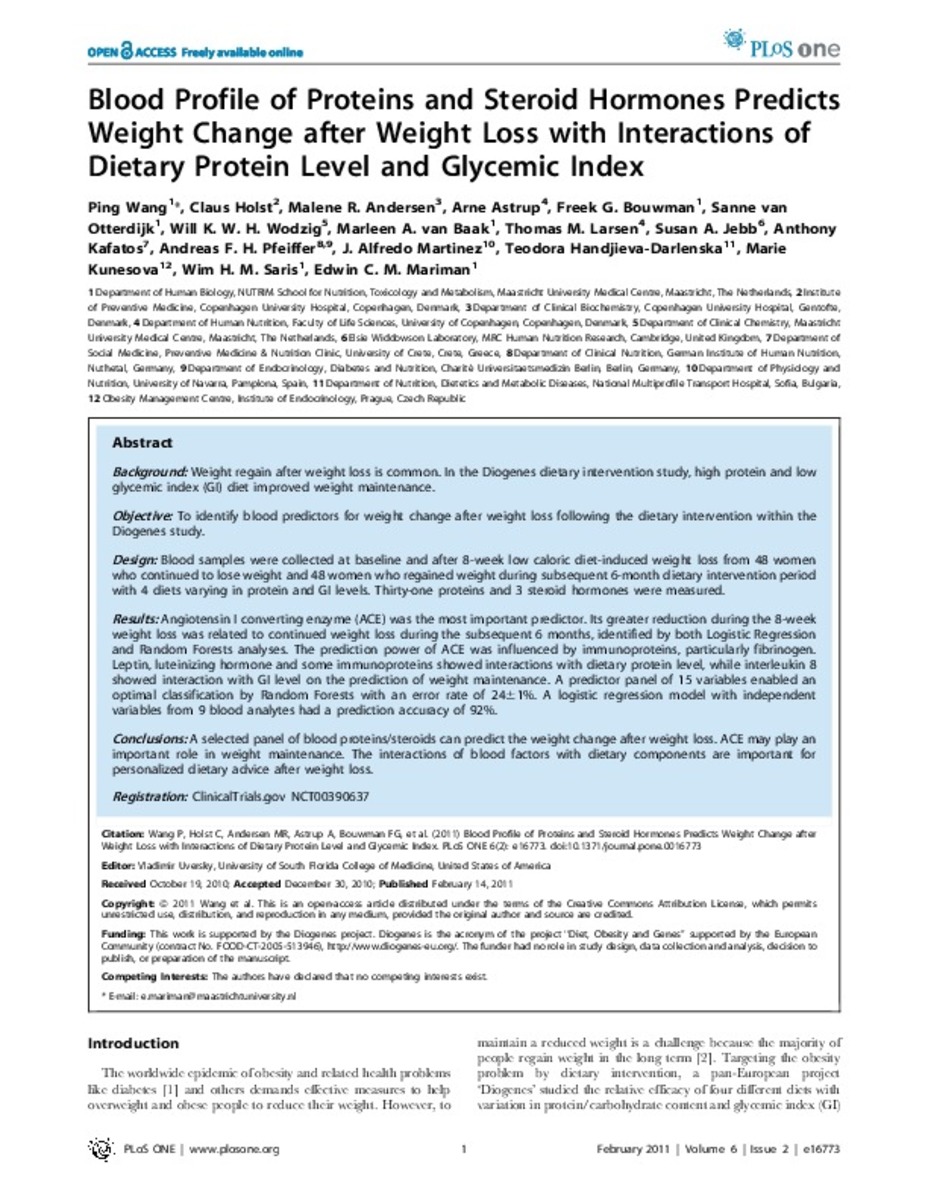Full metadata record
| DC Field | Value | Language |
|---|---|---|
| dc.creator | Wang, P. (Ping) | - |
| dc.creator | Holst, C. (C.) | - |
| dc.creator | Andersen, M.R. (M.R.) | - |
| dc.creator | Astrup, A. (Arne) | - |
| dc.creator | Bouwman, F.G. (F.G.) | - |
| dc.creator | Van-Otterdijk, S. (S.) | - |
| dc.creator | Larsen, T.M. (Thomas M.) | - |
| dc.creator | Jebb, S.A. (Susan A.) | - |
| dc.creator | Kafatos, A. (A.) | - |
| dc.creator | Pfeiffer, A.F. (A.F.) | - |
| dc.creator | Martinez, J.A. (José Alfredo) | - |
| dc.creator | Handjieva-Darlenska, T. (Teodora) | - |
| dc.creator | Kunesova, M. (Marie) | - |
| dc.creator | Saris, W.H.M. (Wim H. M.) | - |
| dc.creator | Mariman, E.C. (E.C.) | - |
| dc.date.accessioned | 2013-03-22T13:41:54Z | - |
| dc.date.available | 2013-03-22T13:41:54Z | - |
| dc.date.issued | 2011 | - |
| dc.identifier.citation | Wang P, Holst C, Andersen MR, Astrup A, Bouwman FG, van Otterdijk S, et al. Blood Profile of Proteins and Steroid Hormones Predicts Weight Change after Weight Loss with Interactions of Dietary Protein Level and Glycemic Index. PLoS One 2011 FEB 14;6(2):e16773. | es_ES |
| dc.identifier.issn | 1932-6203 | - |
| dc.identifier.uri | https://hdl.handle.net/10171/28171 | - |
| dc.description.abstract | Weight regain after weight loss is common. In the Diogenes dietary intervention study, high protein and low glycemic index (GI) diet improved weight maintenance. OBJECTIVE: To identify blood predictors for weight change after weight loss following the dietary intervention within the Diogenes study. DESIGN: Blood samples were collected at baseline and after 8-week low caloric diet-induced weight loss from 48 women who continued to lose weight and 48 women who regained weight during subsequent 6-month dietary intervention period with 4 diets varying in protein and GI levels. Thirty-one proteins and 3 steroid hormones were measured. RESULTS: Angiotensin I converting enzyme (ACE) was the most important predictor. Its greater reduction during the 8-week weight loss was related to continued weight loss during the subsequent 6 months, identified by both Logistic Regression and Random Forests analyses. The prediction power of ACE was influenced by immunoproteins, particularly fibrinogen. Leptin, luteinizing hormone and some immunoproteins showed interactions with dietary protein level, while interleukin 8 showed interaction with GI level on the prediction of weight maintenance. A predictor panel of 15 variables enabled an optimal classification by Random Forests with an error rate of 24±1%. A logistic regression model with independent variables from 9 blood analytes had a prediction accuracy of 92%. CONCLUSIONS: A selected panel of blood proteins/steroids can predict the weight change after weight loss. ACE may play an important role in weight maintenance. The interactions of blood factors with dietary components are important for personalized dietary advice after weight loss. | es_ES |
| dc.language.iso | eng | es_ES |
| dc.publisher | Public Library of Sciences | es_ES |
| dc.rights | info:eu-repo/semantics/openAccess | es_ES |
| dc.subject | Proteins | es_ES |
| dc.subject | Endocrine glands | es_ES |
| dc.subject | Blood coagulation factors | es_ES |
| dc.subject | Leptin | es_ES |
| dc.subject | Luteninizing hormone | es_ES |
| dc.subject | Low proteine diet | es_ES |
| dc.subject | Blood | es_ES |
| dc.title | Blood profile of proteins and steroid hormones predicts weight change after weight loss with interactions of dietary protein level and glycemic index | es_ES |
| dc.type | info:eu-repo/semantics/article | es_ES |
| dc.type.driver | info:eu-repo/semantics/article | es_ES |
| dc.identifier.doi | http://dx.doi.org/10.1371/journal.pone.0016773 | es_ES |
Files in This Item:
Statistics and impact
Items in Dadun are protected by copyright, with all rights reserved, unless otherwise indicated.






